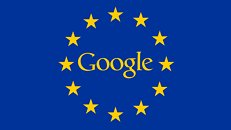Raevenlord
News Editor
- Joined
- Aug 12, 2016
- Messages
- 3,755 (1.20/day)
- Location
- Portugal
| System Name | The Ryzening |
|---|---|
| Processor | AMD Ryzen 9 5900X |
| Motherboard | MSI X570 MAG TOMAHAWK |
| Cooling | Lian Li Galahad 360mm AIO |
| Memory | 32 GB G.Skill Trident Z F4-3733 (4x 8 GB) |
| Video Card(s) | Gigabyte RTX 3070 Ti |
| Storage | Boot: Transcend MTE220S 2TB, Kintson A2000 1TB, Seagate Firewolf Pro 14 TB |
| Display(s) | Acer Nitro VG270UP (1440p 144 Hz IPS) |
| Case | Lian Li O11DX Dynamic White |
| Audio Device(s) | iFi Audio Zen DAC |
| Power Supply | Seasonic Focus+ 750 W |
| Mouse | Cooler Master Masterkeys Lite L |
| Keyboard | Cooler Master Masterkeys Lite L |
| Software | Windows 10 x64 |
Another year, another European Commission fine for an antitrust violation. This time, the target of the fine is none other than Google. In what could be the most important antitrust ruling in recent years (which overshadows even Microsoft's 2004 browser fine), the EC has found that Google has systematically worked towards increasing prominence in search results to those displayed by the company's own comparison shopping service, dubbed "Google Shopping". "Google Shopping" started in 2004, when Google entered the comparison shopping market in Europe, with a product that was initially called "Froogle", renamed "Google Product Search" in 2008 and since 2013 has been called "Google Shopping".
However, it would seem that Froogle wasn't all that successful. When Google entered the comparison shopping markets with Froogle, there were already a number of established players, which dampened the company's market foray. The EC states that Google was aware that Froogle's market performance was relatively poor, pointing to one internal document from 2006 that stated, quite plainly, that "Froogle simply doesn't work".


By increasing prominence of its own "Google Shopping" results in detriment of its competitors, the EC has arrived to the conclusion that Google managed to "increase its [Google Shopping] traffic 45-fold in the United Kingdom, 35-fold in Germany, 19-fold in France, 29-fold in the Netherlands, 17-fold in Spain and 14-fold in Italy." At the same time, the EC states that "(...) traffic to rival comparison shopping services (...) dropped significantly. For example, the Commission found specific evidence of sudden drops of traffic to certain rival websites of 85% in the United Kingdom, up to 92% in Germany and 80% in France. These sudden drops could also not be explained by other factors." The EC further states that should Google not desist on its erroneous, illegal, censored conduct within 90 days, the company would face additional penalty payments of "up to 5% of the average daily worldwide turnover of Alphabet." To put things into perspective, Alphabet's full-year revenue in 2016 stood close to $90 billion. Check the source links for the complete rundown and announcement of the EC.
Commissioner Margrethe Vestager, in charge of competition policy, said: "Google has come up with many innovative products and services that have made a difference to our lives. That's a good thing. But Google's strategy for its comparison shopping service wasn't just about attracting customers by making its product better than those of its rivals. Instead, Google abused its market dominance as a search engine by promoting its own comparison shopping service in its search results, and demoting those of competitors.
What Google has done is illegal under EU antitrust rules. It denied other companies the chance to compete on the merits and to innovate. And most importantly, it denied European consumers a genuine choice of services and the full benefits of innovation."
View at TechPowerUp Main Site
However, it would seem that Froogle wasn't all that successful. When Google entered the comparison shopping markets with Froogle, there were already a number of established players, which dampened the company's market foray. The EC states that Google was aware that Froogle's market performance was relatively poor, pointing to one internal document from 2006 that stated, quite plainly, that "Froogle simply doesn't work".


By increasing prominence of its own "Google Shopping" results in detriment of its competitors, the EC has arrived to the conclusion that Google managed to "increase its [Google Shopping] traffic 45-fold in the United Kingdom, 35-fold in Germany, 19-fold in France, 29-fold in the Netherlands, 17-fold in Spain and 14-fold in Italy." At the same time, the EC states that "(...) traffic to rival comparison shopping services (...) dropped significantly. For example, the Commission found specific evidence of sudden drops of traffic to certain rival websites of 85% in the United Kingdom, up to 92% in Germany and 80% in France. These sudden drops could also not be explained by other factors." The EC further states that should Google not desist on its erroneous, illegal, censored conduct within 90 days, the company would face additional penalty payments of "up to 5% of the average daily worldwide turnover of Alphabet." To put things into perspective, Alphabet's full-year revenue in 2016 stood close to $90 billion. Check the source links for the complete rundown and announcement of the EC.
Commissioner Margrethe Vestager, in charge of competition policy, said: "Google has come up with many innovative products and services that have made a difference to our lives. That's a good thing. But Google's strategy for its comparison shopping service wasn't just about attracting customers by making its product better than those of its rivals. Instead, Google abused its market dominance as a search engine by promoting its own comparison shopping service in its search results, and demoting those of competitors.
What Google has done is illegal under EU antitrust rules. It denied other companies the chance to compete on the merits and to innovate. And most importantly, it denied European consumers a genuine choice of services and the full benefits of innovation."
View at TechPowerUp Main Site




